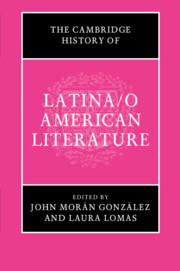Book contents
- The Cambridge History of Latina/o American Literature
- The Cambridge History of Latina/o American Literature
- Copyright page
- Dedication
- Contents
- Contributors
- Acknowledgements
- Chronology
- Introduction
- Part I Rereading the Colonial Archive
- Part II The Roots and Routes of Latina/o Literature
- Part III Negotiating Literary Modernity
- Part IV Literary Migrations across the Americas, 1980–2017
- 22 Undocumented Immigration in Latina/o Literature
- 23 Latina Feminist Theory and Writing
- 24 Invisible No More
- 25 Latina/o Life Narratives
- 26 Poetics of the “Majority Minority”
- 27 The Quisqueya Diaspora
- 28 Listening to Literature
- 29 Brazuca Literature
- 30 Staging Latinidad and Interrogating Neoliberalism in Contemporary Latina/o Performance and Border Art
- 31 Trans-American Popular Forms of Latina/o Literature
- 32 Trauma, Translation, and Migration in the Crossfire of the Americas
- 33 The Mesoamerican Corridor, Central American Transits, and Latina/o Becomings
- 34 Differential Visions
- 35 Temporal Borderlands
- Epilogue
- Bibliography
- Index
- References
33 - The Mesoamerican Corridor, Central American Transits, and Latina/o Becomings
from Part IV - Literary Migrations across the Americas, 1980–2017
Published online by Cambridge University Press: 16 February 2018
- The Cambridge History of Latina/o American Literature
- The Cambridge History of Latina/o American Literature
- Copyright page
- Dedication
- Contents
- Contributors
- Acknowledgements
- Chronology
- Introduction
- Part I Rereading the Colonial Archive
- Part II The Roots and Routes of Latina/o Literature
- Part III Negotiating Literary Modernity
- Part IV Literary Migrations across the Americas, 1980–2017
- 22 Undocumented Immigration in Latina/o Literature
- 23 Latina Feminist Theory and Writing
- 24 Invisible No More
- 25 Latina/o Life Narratives
- 26 Poetics of the “Majority Minority”
- 27 The Quisqueya Diaspora
- 28 Listening to Literature
- 29 Brazuca Literature
- 30 Staging Latinidad and Interrogating Neoliberalism in Contemporary Latina/o Performance and Border Art
- 31 Trans-American Popular Forms of Latina/o Literature
- 32 Trauma, Translation, and Migration in the Crossfire of the Americas
- 33 The Mesoamerican Corridor, Central American Transits, and Latina/o Becomings
- 34 Differential Visions
- 35 Temporal Borderlands
- Epilogue
- Bibliography
- Index
- References
Summary
- Type
- Chapter
- Information
- The Cambridge History of Latina/o American Literature , pp. 674 - 690Publisher: Cambridge University PressPrint publication year: 2018



